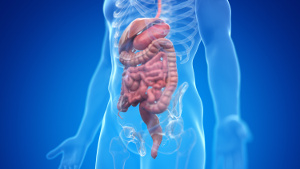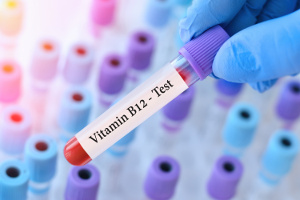 Biotin, one of the B vitamins, is essential for numerous metabolic processes, and a biotin deficiency may be associated with inflammatory bowel disease (IBD). According to a new study that is published in Nutrients, a biotin deficiency can also have a negative impact on the intestinal flora and result in a suppression of symbiotic bacteria and a replication of harmful, dysbiotic bacteria. The scientists say that a disrupted gut flora caused by a biotin deficiency may contribute to inflammatory bowel disorders.
Biotin, one of the B vitamins, is essential for numerous metabolic processes, and a biotin deficiency may be associated with inflammatory bowel disease (IBD). According to a new study that is published in Nutrients, a biotin deficiency can also have a negative impact on the intestinal flora and result in a suppression of symbiotic bacteria and a replication of harmful, dysbiotic bacteria. The scientists say that a disrupted gut flora caused by a biotin deficiency may contribute to inflammatory bowel disorders.
 In connection with tissue lesions, vitamin B12 boosts cellular reprogramming to speed up the healing process. This was shown in a Spanish study of mice with ulcerous colitis (bleeding inflammation in the colon). Based on this, the researchers assume that vitamin B12 supplementation may be useful for speeding up the regeneration of damage intestinal tissue. They mention that vitamin B12 may also help reduce the type of complicated inflammation that is seen with ulcerous colitis, and which contributes to the destruction of the intestinal mucosa. In this connection, it is important to remember that vegan diets lack vitamin B12, and that weak stomach acid and the ageing process can also inhibit the absorption of the nutrient.
In connection with tissue lesions, vitamin B12 boosts cellular reprogramming to speed up the healing process. This was shown in a Spanish study of mice with ulcerous colitis (bleeding inflammation in the colon). Based on this, the researchers assume that vitamin B12 supplementation may be useful for speeding up the regeneration of damage intestinal tissue. They mention that vitamin B12 may also help reduce the type of complicated inflammation that is seen with ulcerous colitis, and which contributes to the destruction of the intestinal mucosa. In this connection, it is important to remember that vegan diets lack vitamin B12, and that weak stomach acid and the ageing process can also inhibit the absorption of the nutrient.
 Biotin, one of the B vitamins, is essential for numerous metabolic processes, and a biotin deficiency may be associated with inflammatory bowel disease (IBD). According to a new study that is published in Nutrients, a biotin deficiency can also have a negative impact on the intestinal flora and result in a suppression of symbiotic bacteria and a replication of harmful, dysbiotic bacteria. The scientists say that a disrupted gut flora caused by a biotin deficiency may contribute to inflammatory bowel disorders.
Biotin, one of the B vitamins, is essential for numerous metabolic processes, and a biotin deficiency may be associated with inflammatory bowel disease (IBD). According to a new study that is published in Nutrients, a biotin deficiency can also have a negative impact on the intestinal flora and result in a suppression of symbiotic bacteria and a replication of harmful, dysbiotic bacteria. The scientists say that a disrupted gut flora caused by a biotin deficiency may contribute to inflammatory bowel disorders.







 Magnesium is important for numerous physiological functions. In a new review article published in Nutrients, researchers have looked at the relation between the body’s magnesium levels and a variety of different ageing markers. Also, they hypothesize that optimal intake of magnesium throughout life is an easy and inexpensive way to obtain healthy ageing.
Magnesium is important for numerous physiological functions. In a new review article published in Nutrients, researchers have looked at the relation between the body’s magnesium levels and a variety of different ageing markers. Also, they hypothesize that optimal intake of magnesium throughout life is an easy and inexpensive way to obtain healthy ageing.


 "After about one week of taking the Q10 supplement I could feel a huge difference," says 23-year old Alan Piccini, who has been suffering from extreme fatigue and muscle aches ever since he was a child.
"After about one week of taking the Q10 supplement I could feel a huge difference," says 23-year old Alan Piccini, who has been suffering from extreme fatigue and muscle aches ever since he was a child. “Taking capsules with co-enzyme Q10 has freed me of the severe side effects of my cholesterol lowering medicine,” Mrs Franken explains.
“Taking capsules with co-enzyme Q10 has freed me of the severe side effects of my cholesterol lowering medicine,” Mrs Franken explains.